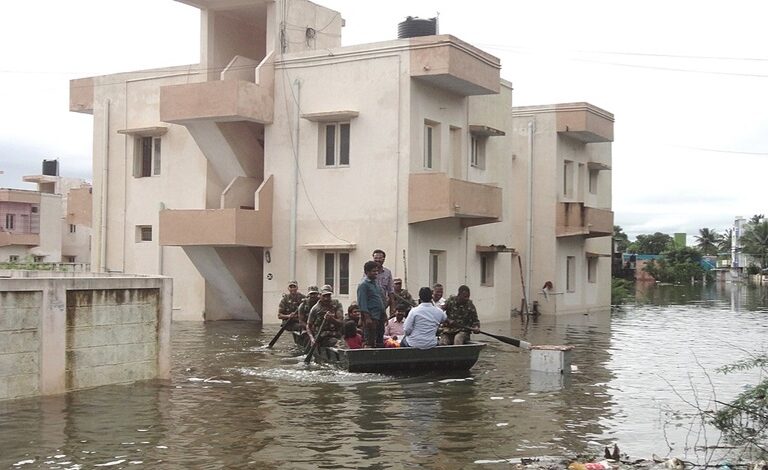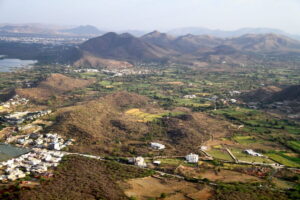Climate Change May Claim 14.5 Million Lives By 2050: WEF

Flood relief and rescue operations by the army in Chennai, Tamil Nadu. Climate change further exacerbates issues such as flood risks in urban areas (Photo by Ministry of Defence of India/Wikimedia Commons)
According to a World Economic Forum (WEF) report published recently, climate change threatens to cause an additional 14.5 million deaths and $12.5 trillion in economic losses worldwide by 2050.
Jointly compiled by the WEF and the consulting form Oliver Wyman, the report is based on “scenarios developed by the Intergovernmental Panel on Climate Change on the most likely trajectory for the planet’s rising average temperature — 2.5 to 2.9 degrees Celsius over pre-industrial levels”, the news agency Xinhua quoted a WEF statement as saying.
The report analysed floods, droughts, heat waves, tropical storms, wildfires and rising sea levels — which are the six major consequences of climate change.
According to the study, flooding alone is estimated to cause 8.5 million deaths by 2050, posing “the highest acute risk of climate-induced mortality”.
The second leading cause of climate-related mortality — droughts — are forecast to claim 3.2 million lives. On the other hand, heatwaves are expected to cause the highest economic losses, at an estimate $ 7.1 trillion by 2050.
Climate crisis will further exacerbate global health inequality and the most vulnerable populations will suffer the most, the report warned. The report predicted that regions such as Africa and southern Asia will remain particularly vulnerable to the impacts of climate change, due to their limited resources such as infrastructure and essential medical equipment.
In its report, the WEF called on global stakeholders to take decisive and strategic action to reduce emissions and mitigate the negative health impacts of climate change.
Shyam Bisen, head of the Centre for Health and Healthcare and member of the Executive Committee at the WEF said, “Recent progress will be lost unless critical emission reduction and mitigation measures are improved, and decisive global action is taken to build climate-resilient and adaptable health systems.”
Climate change is the defining crisis of our time and it is happening even more quickly than we feared. But we are far from powerless in the face of this global threat. As Secretary-General António Guterres pointed out in September 2023, “the climate emergency is a race we are losing, but it is a race we can win”.
No corner of the globe is immune from the devastating consequences of climate change. Rising temperatures are fueling environmental degradation, natural disasters, weather extremes, food and water insecurity, economic disruption, conflict, and terrorism. Sea levels are rising, the Arctic is melting, coral reefs are dying, oceans are acidifying, and forests are burning. It is clear that business as usual is not good enough. As the infinite cost of climate change reaches irreversible highs, now is the time for bold collective action.
Billions of tons of CO2 are released into the atmosphere every year as a result of coal, oil, and gas production. Human activity is producing greenhouse gas emissions at a record high, with no signs of slowing down. According to a ten-year summary of UNEP Emission Gap reports, we are on track to maintain a “business as usual” trajectory.
The last four years were the four hottest on record. According to a September 2019 World Meteorological Organization (WMO) report, we are at least one degree Celsius above pre-industrial levels and close to what scientists warn would be “an unacceptable risk”. The 2015 Paris Agreement on climate change calls for holding eventual warming “well below” two degrees Celsius, and for the pursuit of efforts to limit the increase even further, to 1.5 degrees. But if we don’t slow global emissions, temperatures could rise to above three degrees Celsius by 2100, causing further irreversible damage to our ecosystems.
Glaciers and ice sheets in polar and mountain regions are already melting faster than ever, causing sea levels to rise. Almost two-thirds of the world’s cities with populations of over five million are located in areas at risk of sea level rise and almost 40 per cent of the world’s population live within 100 km of a coast. If no action is taken, entire districts of New York, Shanghai, Abu Dhabi, Osaka, Rio de Janeiro, and many other cities could find themselves underwater within our lifetimes, displacing millions of people.
Global warming impacts everyone’s food and water security. Climate change is a direct cause of soil degradation, which limits the amount of carbon the earth is able to contain. Some 500 million people today live in areas affected by erosion, while up to 30 per cent of food is lost or wasted as a result. Meanwhile, climate change limits the availability and quality of water for drinking and agriculture.





